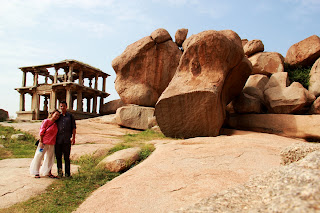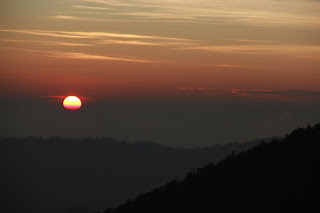"Which way does the trail go?" Uwey asked panting. The sweat pouring off her face and mixing with the dust, making her look like she was crying mud.
"Straight up." I repeated breathlessly. It was a funny question considering we had been working our way up for two long days. The only exception being three hours earlier that morning when we had scrambled straight down. We were nearing the end of the second day in our trekking adventure that took us to the rim of the second largest volcano in a country formed entirely by volcanoes. Mt. Rinjani stands at 12,224 feet and holds a breathtaking lake in its crater. We signed up for the trip thinking it would be a nice change of pace from the slow beach life we had been living. We felt that we may end up lulled into eternity by the lazy towns and lapping waves if we didn't make a clean break.

So, from Senggigi, Lombok we gave into one of the incessant street hawkers offering transport, bike rentals, hotels and necklaces and purchased the three-day adventure. No one told us what the trip would entail outside of drawing a line on a flat map and explaining the rosy details of our equipment, guides and porters.
The next morning we were picked up at the modest hour of 5am and hastily driven across the island. Waiting in the van were two girls, one from England and one from France. At that hour no one had much of a mind for conversation and as the sun rose behind the mountain on which our friendships would grow, we all failed to embellish on the previous night's sleep.
At around 7am we pulled into our last civilized stop, half homestay, half trekking headquarters. There, we were fed a breakfast that would become nauseatingly familiar. Over these plates of Indonesian pancakes we made our formal introductions. The four of us were joined by three other guys, two from Germany and one from Ireland. 'Team Awesome', as we would come to be known, was formed.
After a few fittings of promised boots that wouldn't fit, we all loaded into the bed of a small truck and started up the mountain. We were let off about two miles later and hiked to the park entrance. The path was clear and easy and we followed, packs light on our backs, unknowingly.
The trail is set up in stages with rest stops placed every hour or two along the way. The welcomed sight of those small, green platforms sits in my mind like a cup of coffee in the morning. We landed at the first of these stops around 11am where our crew of four porters and our guide set about making a fire to cook us lunch. The trail to that point had been tantalizingly steep through a lush rain forest full of shade and monkeys. We had tread steadily over sprawling roots that doubled as perfect steps, Uwey and I, with little more than a walk through town as our condition, were feeling fine. A lunch of Ramen noodles, potatoes, green beans, carrots and a hard-boiled egg were delivered steaming. We ate what we could and handed the rest to Paul, the Irishman, who had an appetite fit for the climb. This would become standard procedure. As the porters repacked their impossible loads we were informed that the next stage was the most difficult. Lost somewhere in that vast void between languages, the word 'yet' was omitted. We motivated each other for the toughest leg of the trip, readied our minds for a little pain, told ourselves that we just had to get through this next section and the going would be easy. Our brains compartmentalized, a profoundly useful yet extremely dangerous practice when it concerns mountain climbing. Not one of us; not Cecile who regularly tops the Pyranees, not the Germans, Fabian and Patrick, who's idea of traveling is to conquer, Not Paul who has made adventure his life, not Lindsey with her youthful exuberance and certainly not Uwey nor I, had any notion of what lay ahead.

We trickled into the the next stop, sweat dripping down our backs, feeling congratulatory. This victorious sentiment was met with, 'Yes, more steep.', and a 10 o'clock arm gesture from the guide that dropped the smiles from our faces and the strength from our legs. We had all pictured a trail - a fictitious one on this mountain - where we chatted and laughed, where we trudged along smiling and marveling at the natural beauty. That trail must exist somewhere for we all saw it and we all talked about it as we huddled, some 9,000 feet above the sea, and ate our dinner that night. We had climbed about 7,000 feet that day, the last 3,000 or so at that 10 o'clock angle.

The trail had been so steep that much of it required all four limbs in the loose gravel, clawing for grip and taking steps that often slid their progress backwards. A look up the mountain at the path we were expected to follow was as detrimental to our motivation and frame of mid as a death in the family. When we had finally hobbled into camp we had had to be reassured that it was indeed the stopping point for the day. When the porters began to raise our tents we could, at last, drop our guards and our packs.

In our mind, day two was supposed to be easy. We had been promised a swim in the lake and a soak in the hot springs. After cresting the rim of the volcano by 8am, we followed as the group dropped 3,000 feet into its throat. We savored the view from the top; the lake, the second crater that violently arose in 1994, the smiling faces of our new friends that I was sure we would soon see gracing the pages of Facebook. We have our own images, the two of us frozen in that moment when we still thought it would be an easy day. If we had known what was mind for our bodies, I'm sure we would have saved the energy it took to form those smiles.

So we dropped, many times relying on or waving feet to find a proper foothold and to keep us from dropping hundreds of feet at a time. The descent was so precipitous that at one point I warned Uwey that I may slam her into the rocks football style, as I steadied myself below her, if I saw her slip in an effort to save both of our lives. The margin for error had disappeared with the sun the previous day. This went on for hours.
At last the path evened out and we could step one foot in front of the other. It was amazing what a gift it felt like to walk nearly flat as we passed ideal swimming holes, sure that each one was the spot of our promised dip. But the group filed on, our guide ruthlessly leading around a bend or up and over a small hill. We hadn't quite let go of the idea that this day was supposed to be the most mild of the three but as we walked around half of the large lake a quiet understanding settled in. This was not a pleasure trip. Enjoyment would have to be extracted piece by piece, in the moments in between pain, in the time when our functions were not expended in each next step. The lake was beautiful, beyond question, if for nothing more than the flat expanse it offered our assaulted sense of balance. The clear waters revealed fish swimming easily among the mossless rocks and brought me back to the rivers of California where the torrid currents yield to pools of placid interest to both fish and fisherman. I holstered a dive, remembering that my camera lay buried beneath the necessities on my back. The path rose and fell like my easing breath and as we passed locals, tents set already, I imagined our night amongst them making friends without sales.

After a long while we stopped in a perfect grassy meadow. This was the weak spot in the crater, like the pour spout of a gravy boat, where the lava last flowed down the mountain. We eased into the grass, heads propped on backpacks and legs laid out. A porter made the rounds to inform us that the long-awaited soak in the hot springs had come. We sauntered down the hill, the warm river flowing and dropping on our right. We lost sight of it for a moment - long enough to round a bend - before it reappeared boldly, its flow
burgeoning into a large waterfall. We stripped to our bathing suits and got wet. We gathered beneath the waterfall and let the 90 degree water fall heavily over our bodies. The size of the falls blurred the line between shower and massage and we lingered. This was the time many of us had been anticipating and for some time we were unable or unwilling to budge. Then the porter returned. It was time for lunch.










































